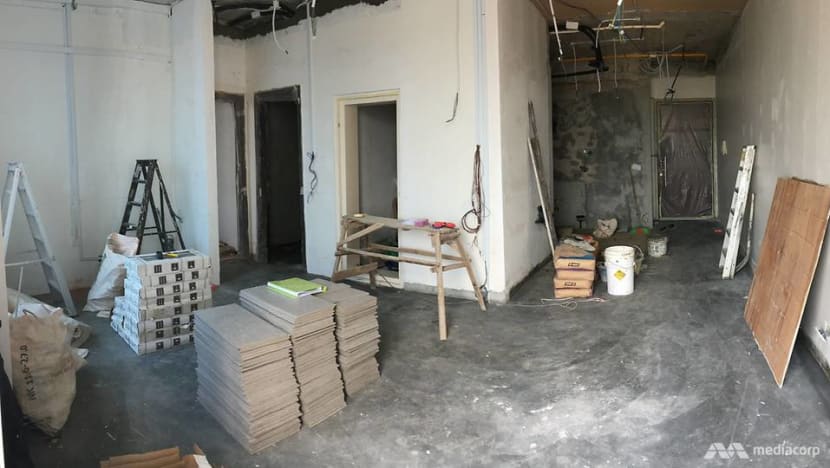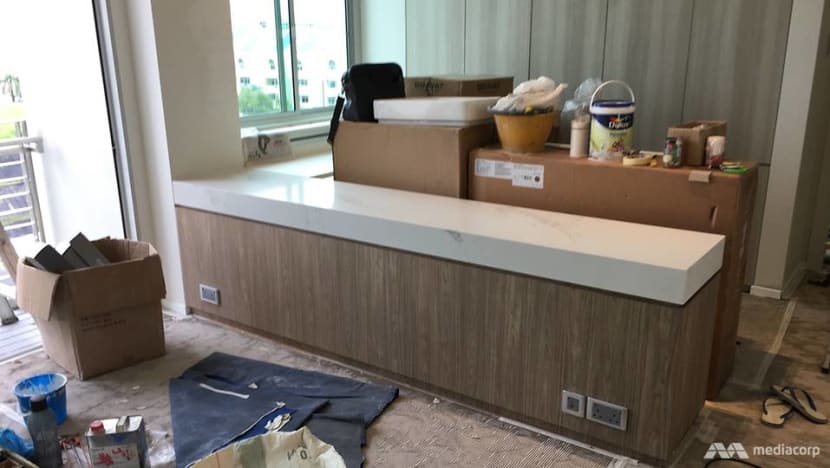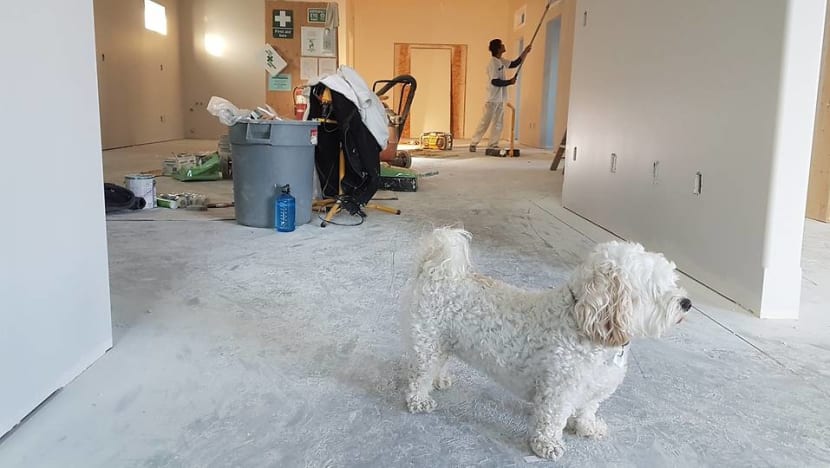Uptick in complaints about renovation noise as more people work from home

File photo of an apartment undergoing renovation work.
SINGAPORE: Taking Zoom calls for work can be tricky for Theodore Tan, whose flat in Admiralty is surrounded by units undergoing renovation.
“I have to mute myself, I speak only when I really need to and I have to hope there’s no hammering, drilling or hacking going on,” said the 26-year-old researcher who works from home.
The peace and quiet he appreciated during Singapore’s COVID-19 "circuit breaker" period have been chipped away since some contractors got the green light to restart renovation work in mid-June.
When he received three separate notices of renovation work in his block a few weeks ago, frustration and resignation set in.
READ: More than 19,000 home renovation projects allowed to resume work after circuit breaker
“Usually, I’d be at my work place five out of seven days a week and I wouldn't experience the noise. But now that I work from home, I experience it all the time,” he told CNA.
“It makes it hard to focus, even if I try to play music to block it out.”
Mr Tan added that hammering and drilling are relatively more bearable as they often do not last more than an hour.
"But if it’s a demolition of wall – that will really drive blood pressure up," he said.
MORE COMPLAINTS ABOUT RENOVATION NOISE
Mr Tan's experience is not uncommon.
Complaints about renovation noise have gone up amid a backlog of projects to be completed after the circuit breaker, plus the fact that more people are working from home because of the COVID-19 pandemic.
From Jun 2 to Oct 31, there were 286 complaints about renovation noise among landed property residents, the National Environment Agency (NEA) told CNA.
This is a 60 per cent increase from the 178 complaints it received in the same period in 2019.
“About 10 per cent of the complaints involved renovation sites where noise levels exceeded the limits. NEA took enforcement action against the contractors responsible for these sites,” the agency said.

However, it noted that overall complaints about construction noise, which includes renovation noise, fell from 4,170 to 3,682 in the same period.
This is due to the “lower number of active construction sites in the initial months after exiting the COVID-19 circuit breaker on Jun 2", said NEA.
READ: Review of construction noise limits to consider residents working from home: Desmond Tan
As for public housing, the Housing and Development Board (HDB) was unable to provide representative figures on complaints about noise from renovation work.
“As feedback providers may contact HDB more than once to give feedback on the same case, the total number of feedback received is not representative of the actual number of cases on the ground. Hence, it would not be meaningful to provide such figures,” it told CNA on Monday (Nov 23).
Read: HDB received more reports about issues like cigarette smoke, noise during circuit breaker: Sim Ann
HDB added that it has “stepped up efforts to reduce disamenities” caused by renovation works by reminding flat owners and contractors about various requirements and good practices.
These include reminding contractors to give neighbouring units written notice about noisy work such as hacking, at least three days before they start.
Complaints in condominiums are handled by their respective managing agents.

WHAT TO DO IF YOU ARE AFFECTED BY THE NOISE
For those who are affected by the noise from neighbouring homes, the general advice is to make plans to get out of the house during the renovation period, said Michael Ong, the assistant secretary of the Singapore Renovation Contractors & Material Suppliers Association.
If going out is not possible amid the pandemic, there are other suggestions.
“If the unit being renovated is opposite your apartment, open your windows but close the doors. If the unit being renovated is above or below yours, open the windows and the doors. If not, you will contain the vibrations inside the house,” Mr Ong said.
He also recommended ear plugs or noise-cancelling earphones if needed.
If the noise is too much to bear, he said neighbours can make requests – within reason – to stop the renovation works temporarily.
“You must be mindful that work must still go on, but if you say: ‘Can you stop for one day? My kid is having a big exam today.’ We will try to stop," said Mr Ong.
“But the maximum is three days, any request beyond that I don’t think our clients would entertain,” he added, citing the need to keep up with project timelines.
WHAT TO DO IF YOU’RE RENOVATING
Mr Ong said those renovating their homes should speak to their new or existing neighbours personally – beyond merely informing them about the work through a notice.
“A couple of my clients bring cookies for their neighbours as a gesture of goodwill so they’ll be happier. Then even when the renovation starts, they can bear with it,” he said.
Mr Ong added that in Singapore’s dense, urban housing environment, it is important to have a spirit of neighbourliness and understanding “that these situations are inevitable”.
“The key is both parties must be reasonable,” he said.















